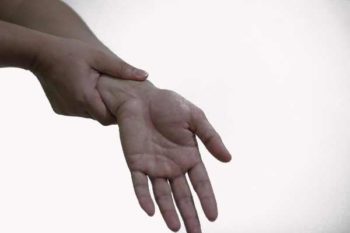Have you heard many horror stories about all the side effects of hysterectomy?
Wonder what happens to the body after a hysterectomy?
How long will the ovaries work after a hysterectomy? Will there be long-term side effects?

Don’t let the thought of all the possible problems after a hysterectomy scare you too much. In reality, most of the side effects are related to menopause. Meaning someday, you will have to face most of the problems that come with menopause anyway.
I won’t deny that hysterectomy surgery can provoke many side effects. Some are fairly common, and understandable why they happen. Other side effects happen less frequently; you have probably never heard of them.
Surely a hysterectomy may have certain physical and psychological side effects on women. But many depend on whether you can keep your ovaries or not. Without your ovaries, you will go abruptly into menopause with all the troublesome symptoms that come with it.
When this happens, hormone replacement therapy is your best option to ward of any negative effects.
Interesting facts you should know about the side effects of hysterectomy
Want to know more about the side effects of hysterectomy and why they occur? In this post, we will try to clarify some of the issues you may have to deal with after a hysterectomy.
Sore breasts after hysterectomy
Breast pain is one of the unexpected side effects of hysterectomy that some women experience. You will continue to cycle after the hysterectomy when they leave the ovaries. You won’t have monthly menstrual bleeding because you have no uterus. But you will still have ovaries that are producing hormones. That’s why you still may have premenstrual symptoms such as tender, swollen and painful breasts, also known as cyclical mastalgia.
A woman with her ovaries removed during the hysterectomy may also experience breast soreness if she takes HRT.
There are many more reasons women can experience breast pain. They can be innocent, like off consuming too much caffeine, chocolate, or other things in her diet. Our first thought usually is that it may be a sign of breast cancer. So if it worries you or when you can feel a lump, a mass, or see any skin changes in your breast, you need to examine it by a doctor.
Read more in our post: Are painful breasts after hysterectomy a cause for concern?
Hysterectomy and joint pain

Very few women know that joint pain is a common side effect of hysterectomy. Estrogen has a protective and anti-inflammatory effect on your body and joints.
Reduced estrogen levels can harm your joints through chronic inflammation and pain. This is generally the most accepted explanation for why your joints may hurt following a hysterectomy.
Read more: How to deal with a sudden onset of joint pain after hysterectomy?
Hysterectomy migraines
Migraines can both improve and worsen with surgery. Hormonal fluctuations often trigger side effects of hysterectomy, such as migraines. You may have noticed that your migraines usually worsen during your period.
According to the American migraine foundation, some women who suffer from migraines before surgery may benefit from a hysterectomy with ovary removal. But the sudden drop in hormones may worsen the symptoms for others.
Discuss this with a doctor if you fear a hysterectomy may negatively affect your migraines. You may benefit from wearing an estrogen patch right after surgery, preventing an enormous estrogen drop.
Read more about menopausal headaches and migraines.
Insomnia after hysterectomy
Sleeplessness is a common complaint after a hysterectomy. When you lose your ovaries during the surgery, you will have to deal with estrogen withdrawal symptoms. Due to low estrogen, you may experience night sweats, anxiety, and aching joints after the surgery, making it difficult for you to get to sleep. These hormonal outbreaks may wake you several times in the night, causing you to be moody, irritable, and tired the following day.
Read more: Trouble sleeping after a hysterectomy- 10 Tips for managing sleep issues.
Mood swings after hysterectomy

For some of us women, a hysterectomy’s emotional side effects are more severe than the physical effects of a hysterectomy. Sudden estrogen withdrawal can cause havoc to our system and provoke sudden tears, irritability, and a sense of loss. When both ovaries are surgically removed, these emotions may hit women suddenly and fiercely.
Estrogen is a hormone that has the power to increase our serotonin levels, which regulates our mood. Low estrogen is also associated with anxiety, panic attacks, and depression after hysterectomy.
Most women with these side effects of a hysterectomy are treated with anti-depressants. In contrast, they would probably benefit more from proper hormone replacement therapy to correct hormonal imbalances.
Mini periods after a partial hysterectomy
It is not uncommon that women with a supracervical hysterectomy and their ovaries in place to have mini periods after a hysterectomy. During a supracervical or partial hysterectomy, they remove only a part of the uterus and leave the cervix in place. Because this has the same lining as the uterus, women can still have small amounts of monthly bleeding.
Normally, during surgery, they cauterize the cervix’s inner lining to prevent this. But some endometrial tissue can remain. When can you expect mini periods to stop? They will usually stop when the ovaries stop producing hormones. If the mini periods are really bothering you, talk to your physician. He can check if it is necessary to cauterize the cervix again with silver nitrate or a laser.
Leg numbness after hysterectomy
Some women complain about knee jerks and leg numbness after a hysterectomy. This is known as femoral neuropathy and can occur after a vaginal hysterectomy or any gynecological surgery where the woman’s legs are put in stirrups. These will put the woman’s hips in an awkward position.
Excessive rotation of the hip may cause nerve compression that provides sensation to the leg. If you notice that your thighs are numb after surgery, you should let your doctor know. Adverse side effects of hysterectomy, like leg numbness, are something that can be successfully treated with physiotherapy.
Itching after hysterectomy
It is not unusual that women to have problems with itching after a hysterectomy. As with many other hormonal hysterectomy side effects, this is a common symptom of menopause. With a decline in estrogen, you may notice certain skin changes.
Estrogen has many beneficial effects on our skin. It helps the skin maintain its thickness and keeps it soft and firm. So, when estrogen levels drop during and after menopause, a woman’s skin may become drier and itchier.
Odor after hysterectomy
A small percentage of women notice a weird vaginal odor after a hysterectomy. During recovery, old blood and dissolving suture material may cause a bad-smelling vagina. An offensive fishy smell is often the result of a vaginal yeast infection.
Anesthesia and the medication you get after surgery can make your urine smell different. Though, bad-smelling urine may also indicate a urinary tract infection after a hysterectomy.
Hair loss after hysterectomy

We may see hair loss as a side effect of hysterectomy when there is heavy bleeding or prolonged pressure on the scalp during surgery.
But also, the emotional stress before and after the surgery may cause temporary hair loss. Stress may cause your adrenal gland to produce more cortisol.
High “stress hormone” cortisol levels may disrupt the hair follicle’s normal growth cycle.
Read more: Hair loss after hysterectomy – Get to know the facts before you drive yourself crazy
Bleeding after intercourse after hysterectomy
After a hysterectomy, the most common cause of slight bleeding after intercourse is from granulation tissue. This granulation tissue or excess scar tissue delays the healing process of the vaginal cuff.
Roughly one-third of all women having an abdominal hysterectomy may have problems with granulation after the surgery. Your gynecologist may want to wait for these lesions to heal spontaneously. This usually depends on how large these lesions of granulation are. He may want to cauterize with silver nitrate if there are larger lesions.
Read more: Post hysterectomy bleeding, when should you be worried.
Vaginal dryness after a hysterectomy
Most side effects of hysterectomy are associated with premature menopause. For example, vaginal dryness is a typical symptom of menopause many females have to endure. Vaginal dryness is not only uncomfortable but can make intercourse painful, Some women will avoid having sex, and this can put stress on a relationship.
The hormonal changes after a hysterectomy make the vaginal wall thinner and reduce its muscle tone. Vaginal lubricants and topical estrogen creams can be helpful in relieving the problem of vaginal dryness.
Read more: What you should know to cure vaginal dryness.
Chronic yeast infections after hysterectomy
As we already mentioned, with the hormonal changes after a hysterectomy, the vaginal wall may become weaker, dryer, and thinner. This means that during intercourse, the tissue becomes irritated and prone to injuries. These vaginal changes make it easy for yeast and other microorganisms to flourish, increasing the risk of infection.
Read more: Troubled By A Yeast Infection After Hysterectomy? Get Rid Of It Once And For All
Leaking urine after hysterectomy
Lack of bladder control is one of the side effects of a hysterectomy quite a few women have to deal with. During a hysterectomy, they cut through muscles, nerves, and tissues that normally support your bladder. To maintain proper bladder function, the bladder, and urethra need to be sufficiently supported by these structures.
When they remove the uterus, that support is often compromised. Suppose you are leaking urine after your hysterectomy surgery. In that case, you may benefit from pelvic floor physical therapy to restore the muscle tone of the pelvic floor and the sensation in that area.
Read more: What to do about bladder problems after hysterectomy?
Hysterectomy and memory loss
Many women complain of difficulty recalling names and memory lapses after a hysterectomy. For the brain to function properly, it requires sufficient estrogen.
Estrogen levels may affect a part of the brain called the hippocampus, which helps process and retrieve one’s memory. It also turns short-term memories into long-term memories, which then are stored somewhere else in the brain.
Read more: 10 tips to get rid of menopausal brain fog and boost your memory after hysterectomy
This is why menopausal women and women after a hysterectomy may have memory lapses or find it hard to concentrate and absorb information. You may be glad to learn that this so-called “brain fog” is a temporary phase, just like many other menopause symptoms.
